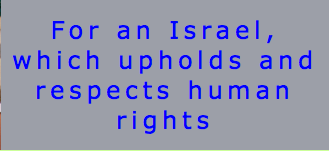"Israel as a Jewish and democratic state"
Dear signatories of the Appeal by concerned Jews to the Israeli Government
Our last mail about “Israel as a Jewish and democratic state” triggered a few reactions from your midst. We would like to outline some of our thoughts on this subject.
There is an ongoing debate among political scientists in Israel about this question. Basically three concepts are discussed: Israel is described as “Ethnic Democracy”, as “Ethnocracy” and as Formal Democracy combining different concepts of citizenship for Jews and Arabs.
The Israeli sociologist Sammy Smooha describes Israel as the archetype of an “Ethnic Democracy”. An ethnic democracy combines full political and civil rights for all citizens with a structured dominance of one ethnic group. Smooha writes: »Ethnic democracy is a system in which two contradictory principles operate: “the democratic principle”, making for equal rights and equal treatment of all citizens, and “the ethnic principle”, making for fashioning a homogeneous nation-state and privileging the ethnic majority« [Smooha 1998:200].
Others [Ghanem/Rouhana/Yiftachel 1998] have criticized the term “ethnic democracy” for the Israeli state, because core elements of democracy – equality of all citizens, minority rights and clear boundaries of sovereignty – do not exist in Israel. They describe Israel as “Ethnocracy”. An ethnocracy consists of a political system that ensures domination and control of one ethnic group in the state. In such a system, rights and privileges depend not on the status of citizenship but on ethnical origin. The functions of legal, institutional and executive instruments of power are to ensure ethnic dominance of one group.
Still other scholars [Shafir/Peled 2002] draw on the distinction between liberal and republican citizenship in order to describe the Israeli system. Liberal citizenship is a passive status conferring political rights and duties on citizens. In Israel all citizens – Jews and Arabs alike – enjoy the status of liberal citizenship: they can vote, run for election and have to pay taxes. Republican citizenship however is a status that bestows membership and the possibility of participation in a moral collective – a “nation”. In Israel, only Jews enjoy this status of republican citizenship: »[W]hile Jews and Arabs formally enjoy equal citi¬zenship rights, only Jews can exercise their citizenship as practice, by attending to the com¬mon good«. The “common good” in Israel is defined as the interest of the Jewish nation. While Palestinians have the same formal status as Jewish Israelis, they are discriminated against on a structural and personal level. This discrimination stems from the fact that they are not considered as belonging to the Jewish nation for which the state of Israel was built. The definition of Israel as democratic and Jewish state formulates inclusion and exclusion of the Palestinian minority at the same time.
On one hand Israel is a representative Democracy – as opposed to a Monarchy, Autocracy, Dictatorship. On the other hand the State of Israel is conceived of as the state of the Jewish People, thereby excluding all non-Jewish citizens to a lesser status. In purpose and content then, Israel can only be called a true democracy if it perceives itself to be the State of the Israeli people, meaning: the state of all its citizens.
Best regards,
Shelley Berlowitz and Jochi Weil

